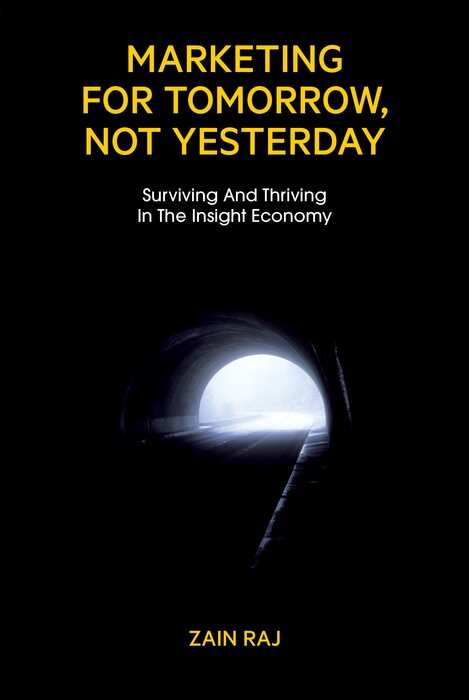Marketing for Tomorrow, Not Yesterday
Surviving and Thriving in the Insight Economy
- 2015 INDIES Finalist
- Finalist, Business & Economics (Adult Nonfiction)
This insightful book demonstrates why chief marketing officers cannot continue “business as usual.”
Given Zain Raj’s impressive credentials and professional experience, he is one to be taken seriously when he writes, “Everything’s changed, but not everyone’s paying attention.” The challenge for chief marketing officers, the audience for Raj’s latest book, is to recognize the implications of the shift to what Raj calls the “Insight Economy,” largely driven by a very informed and engaged consumer who, ironically, is starved for time because of the glut of information. Today, Raj observes, “The assault of content, the creation and consumption, means that we live in an always-on and always-distracted world.”
Raj acknowledges that most CMOs are struggling to keep up. His answer is for the top marketing executive to stop specializing and become what he calls a “Marketing Decathlete”— a professional who should be good in ten disciplines, not merely one. Not only does Raj identify the ten areas, which include “Digital Awareness,” “Data Facility,” and “Customer-centricity,” he also provides specific examples for each, as well as vignettes of several CMOs who exemplify the Marketing Decathlete.
Perhaps the most intriguing aspect of the book is the author’s penchant for provocative pronouncements. For example, his take on social media is that while it may be difficult for marketers to prove its ROI, the negative influence of a social media backlash on a brand’s reputation can be substantial. Raj includes several pertinent examples to support his argument, making a case for managing social media “as a critical business function,” not just a marketing medium. Similarly, while many marketers are touting “big data” as the next big thing, Raj warns that marketers should not be enamored of it simply because it’s trendy, pointing out that “the questions we’re asking about big data should be less speculative about its place in the annals of marketing history (or marketing’s future) and more focused on what big data can—or can’t—actually do for us.”
In the end, Marketing for Tomorrow, Not Yesterday presents no easy solutions, but Zain Raj’s sound advice is delivered authoritatively and clearly. He backs up his opinions with good examples every step of the way. His four steps for moving into the future at the end of the book, while not earth-shattering, are sensible and encouraging. The author writes economically, in a simple, direct, and powerful style, making the book a breeze to read. Still, the author did miss an opportunity to further expand readers’ knowledge by not including a bibliography.
The no-nonsense, pragmatic approach of Marketing for Tomorrow, Not Yesterday should have considerable appeal to the senior-executive audience.
Reviewed by
Barry Silverstein
Disclosure: This article is not an endorsement, but a review. The publisher of this book provided free copies of the book and paid a small fee to have their book reviewed by a professional reviewer. Foreword Reviews and Clarion Reviews make no guarantee that the publisher will receive a positive review. Foreword Magazine, Inc. is disclosing this in accordance with the Federal Trade Commission’s 16 CFR, Part 255.

